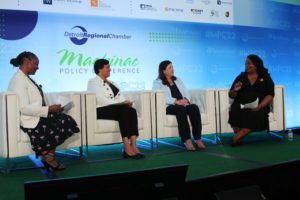Advancing Equity Panel: The ‘Great Resignation’ Was a Cry for Workplace Change
June 1, 2022- The “Great Resignation” was a cry for culture change in the workplace that began during the pandemic — people demanded better hours, wages, treatment and opportunities
- In 2020-2021, nearly 300,000 women left the workplace in Michigan, and mothers with children 13 and younger are still not employed at the same rate as they were pre-pandemic
- Women and childcare workers need to be at the top of the agenda when creating a better, more equitable workplace environment
- Diversity, equity, and inclusion programs are key to building trust and stability in the workplace
 During the height of the pandemic, the “Great Resignation” led to individuals across the nation exiting the workforce in droves. As Candice Fortman, executive director of Outlier Media explained, people began reevaluating how work should and could fit into their lives, while many business leaders and executives began to dig deep and do the work to create more equitable and opportunistic workplaces.
During the height of the pandemic, the “Great Resignation” led to individuals across the nation exiting the workforce in droves. As Candice Fortman, executive director of Outlier Media explained, people began reevaluating how work should and could fit into their lives, while many business leaders and executives began to dig deep and do the work to create more equitable and opportunistic workplaces.
“As employers, it’s important to think about the value proposition we give to our employees and the value proposition we contribute to society,” said La June Montgomery Tabron, president and chief executive officer of the W.K. Kellogg Foundation.
Cheryl Bergman, executive director of Michigan Women’s Commission, kicked off the panel discussion with this statistic:
“From February 2020 to December 2021, nearly 300,000 women have left the workforce entirely in the state of Michigan and nationally, mothers with children 13 and younger are still not employed where they were pre-pandemic — so there’s work to do there,” Bergman said.
Bergman also addressed the importance of combating inequities in childcare through the Michigan Tri-Share Child pilot program throughout Detroit and the state of Michigan. “The idea of the pilot is to retain and attract employees; for families to be able to afford childcare and to provide some stability for childcare providers,” Bergman said.
“Higher Reach” and “Rise Up” are key evidence-based programs working to help decrease hiring barriers for people across Michigan, led by Shana Lewis, vice president of talent acquisition and workforce programs at Trinity Health. Not only is she dedicated to finding diverse talent, but Lewis works to implement workplace training related to addressing racial inequities in the workplace through implicit bias training programs.
“Trinity as an organization has committed to how our diversity, equity, and inclusion practices are structured,” Lewis said. “At every turn it’s a journey; it’s a culture change; it’s a mind shift.”
Montgomery Tabron further emphasized the need to build better workplace environments by addressing racial inequities through mandatory employee training and implementing workplace standards that allow everyone to have a seat at the table.
“We are now an organization where over 50% of employees are people of color,” Montgomery Tabron said of the W.K. Kellogg Foundation. “It was about training people to heal; and healing is about trust-building, relationship building; bring people together. Healing is at the heart of racial equity.”
Thank you to the W.K. Kellogg Foundation for hosting this session.
